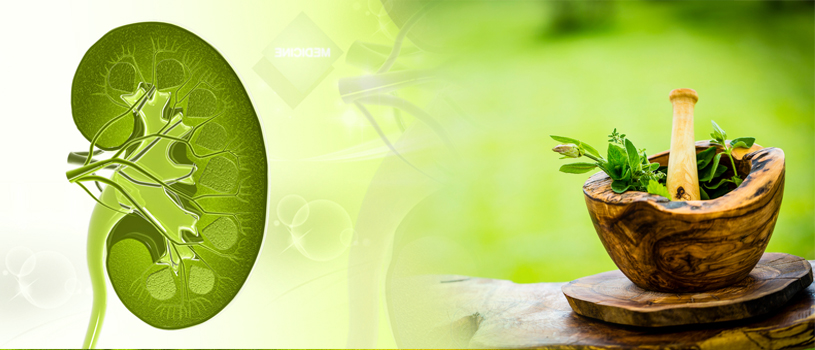It is estimated that nearly 1 million people worldwide die from untreated kidney diseases each year. Allopathic treatment for kidney disease is costly and thus is not available to everyone. There is always a need to work on an alternative treatment for kidney disease that is trustworthy, scientific, and accessible to all.
How can ayurveda be an alternative to the modern medical system?
Ayurveda is our ancient medical science. Ayurveda defines the body’s three principal energies, namely, Vata, Pitta, and Kapha. Each one of us has these principle energies or doshas. The doshas are present with varying strength and magnitude in everyone. Mostly, one dosha is predominant among the rest, which determines the overall constitution of the individual. This is also called the Prakriti of that person.

According to Ayurveda, diseases start occurring when these doshas become vitiated due to some external or internal stimulus. This stimulus could be eating disorders and the amount of physical activity you get in a day.
A normal healthy person has a balance of three doshas. Ayurvedic treatments thus ensure that all three doshas should be at their optimum levels. Prakriti or inherent constitution of an individual helps to decide the duration and method of the treatment. Modern medicine system is contrary to Ayurveda. Ayurvedic treatments work with the power of nature and the body’s inherent qualities to heal itself. The treatments are performed by certified Ayurveda practitioners.
How does ayurveda work?
The most common techniques for diagnosing an illness in the Ayurvedic system are Naadi Pariksha and Ashtavidha Pariksha. Naadi Pariksha refers to checking the pulse, whereas Ashtavidha Pariksha is more elaborate and involves nadi pariksha along with information about urine, faeces, tongue, voice, skin, eyes, and overall body appearance. A knowledgeable and well-trained Ayurveda practitioner would be able to determine the underlying condition using these methods. These parikshas or tests describe an individual’s basic physiological and psychological makeup and also provide an insight into the dosha imbalance.

After the assessment, the practitioner will prescribe kidney herbal remedies, diet, exercise, and certain lifestyle adjustments to start the healing process and effect positive changes in your body.
There is a common misconception that Ayurvedic and allopathic treatments cannot work alongside. If your doctor allows, you can also seek Ayurvedic treatments in a supplementary manner to expedite healing and recovery.
Ayurveda also promotes lifestyle adjustments. It aims to harmonise the body, mind, spirit, and surroundings. The use of ayurvedic medicines can bring about this balance. An internal cleansing process is the first step in ayurvedic treatment. A special diet, a few herbal medicines, and, if necessary, some particular massage therapy, yoga, and meditations are recommended.
Ayurveda treatment for Kidney Disease
Ayurvedic treatments aim to improve bodily resistance, eliminate symptoms, and remove impurities. It works to make life more peaceful and less stressful and make use of natural resources like plants, and herbs for these procedures. Ayurveda first comprehends the causes of the condition. It has also been observed that the patients with kidney diseases have altered Agni and this leads to improper digestion of food and production of “ama ”. These days, how we live is pulling us away from nature; eating untimely meals, consuming alcoholic beverages, chewing cigarettes, and being under intense stress all contribute to disrubed Agni.

In addition to considering the patient’s capacities, Ayurveda evaluates the ailment in terms of Dosha, Dushya, and Adhisthana. Appropriate therapy actions are planned following accurate identification and assessment. The current medical system is expensive. Due to this, cheap, risk-free medical treatment is required. Our traditional medical system, Ayurveda, offers sustainable therapeutic options. According to Ayurveda, we classify every kidney ailment as “Prameha.”
All urinary diseases are brought on by the Vata dosha, which also works with Pitta and Kapha to cause them. Everybody has a different balance of the doshas pitta and Kapha. As a result, tailored care must be provided while taking the Doshas into account. Virechana, swedana, mutrapravartaka, raktaprasadaka, Agni deepen, and sarva dhathu poshaka are some of the common suggested treatments for renal failure. In Ayurveda, there is also the idea of pathya-apathyas (compatibles-incompatibles). Rasayana Chikitsa, an Ayurvedic herb that aids nephron regeneration, contains regenerative herbs.
What are the treatment procedures for kidney diseases in Ayurveda?
Kidney disorders, also known as Mutravaha strotosdushti, are predominantly treated in Ayurveda utilising Basti (Enema therapy). A medicated detox therapy is an enema.Injected through the urinary system, it works for removal of toxins that have built up. Additionally, the aggravating doshas that could harm the kidneys are eliminated.
Diet (Ahaar) and lifestyle (Vihaar) are changed as per the requirement of the disease. These suggestions are to combat kidney diseases. Herbs like ‘Punarnava,’ ‘Gokhuru,’ and ‘Varuna’ are patient saviours. ‘Varuna’ in ayurveda has been used as a blood purifier and helps to maintain homeostasis. ‘Gokhuru’ is found beneficial in kidney nephron rejuvenation.

Lifestyle management for kidney diseases
For the management of any disease, ayurveda suggests lifestyle changes. Kidney diseases can be managed with a healthy lifestyle. To prevent further kidney damage, some preventive measures and ayurvedic treatment for kidney infection can be immensely beneficial. These simple tips will help you in keeping your kidneys healthy. These management tips include the following:
- Restriction on the use of table salt. The sodium in salt can cause deteriorating effects on kidneys. Salt is the commonest preservative. Consuming preserved foods can thus be dangerous to kidney patients.
- Ginger, garlic, and onion, if added to the diet can facilitate toxin elimination.
- Fresh fruits and vegetables to be included in your daily diet. The addition of fresh fruits and vegetables will help in keeping your system clean and healthy.
- Reducing the amount of sugar and carbohydrates will also help in maintaining kidney health.
- Potassium can cause damage to the kidney. It is advised to maintain a balance of sodium and potassium in your diet.
- It has been observed that people suffering from proteinuria also suffer from hypomagnesemia. Therefore, a diet consisting of an adequate amount of magnesium- should be consumed.
- Start exercising regularly.
- Udvartan, or regular dry massage, has been found beneficial for kidney patients too.
- Keep your blood pressure normal.
- A regular steam bath may serve helpful to reduce fat in obese and diabetics. These two conditions are the ones primarily involved for kidney diseases.
- Pranayama /breathing exercises are also beneficial. These have a calming effect on your mind and body.
You are always advised not to take any ayurvedic medicines without proper medical consultation.

